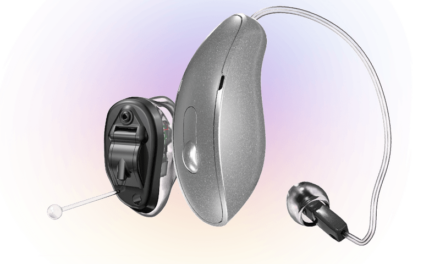Study suggests hearing aids could be a cost-effective and minimally invasive treatment to reduce dementia risk
A study published in The Lancet Public Health journal on April 13, indicates that individuals with untreated hearing loss may face an increased risk of dementia compared to those without hearing loss. However, the authors of the study suggest that using a hearing aid could potentially lower this risk to a level similar to that of individuals without hearing loss.
Experts say that hearing loss and dementia are prevalent conditions in the elderly population. The 2020 publication of The Lancet Commission on dementia prevention, intervention, and care revealed that hearing loss could be associated with approximately 8% of dementia cases worldwide. Thus, addressing and managing hearing impairment could potentially play a role in reducing the overall global burden of dementia.
According to Dongshan Zhu, PhD, at Shandong University in Shandong Province, China, “The evidence is increasingly pointing towards hearing loss as a significant modifiable risk factor for dementia in mid-life. However, the effectiveness of hearing aid usage in reducing dementia risk in real-world scenarios has remained uncertain. Our study offers the most compelling evidence to date that suggests the use of hearing aids could be a minimally invasive and cost-effective treatment option to mitigate the potential impact of hearing loss on dementia.”
Reportedly, the study analyzed data from the UK Biobank database, which included information from 437,704 individuals. Self-reported questionnaires were used to collect data on hearing loss and hearing aid usage, while dementia diagnoses were determined through hospital records and death register data. Experts gathered that the average age of participants at recruitment was 56 years, and the average follow-up time was 12 years.
Researchers estimated that approximately 75% of the participants (325,882 out of 437,704) did not report any hearing loss, while the remaining 25% (111,822) had varying degrees of hearing loss. Among those with hearing loss, 11.7% (13,092 out of 111,822) reported using hearing aids.
When adjusting for other factors, the study findings indicate that individuals with untreated hearing loss had a 42% higher risk of all-cause dementia compared to those with normal hearing. However, no increased risk of dementia was observed among individuals with hearing loss who reported using hearing aids.
According to the researchers, the study findings suggest that the risk of dementia in individuals with untreated hearing loss, who are not using hearing aids, is approximately 1.7%, while the risk among those without hearing loss, or with hearing loss but using hearing aids, is 1.2%. Zhu emphasizes that nearly 80% of individuals with hearing loss in the UK do not use hearing aids.
Experts say that hearing loss can start as early as one’s 40s, and gradual cognitive decline before dementia diagnosis can last for 20 to 25 years. According to the researchers, the results of the study highlight the urgent need for early intervention with hearing aids when hearing impairment arises.
The study also examined the potential impact of other factors such as loneliness, social isolation, and depressive symptoms on the association between hearing loss and dementia. The analysis reportedly revealed that less than 8% of the observed association between hearing aid use and reduced risk of dementia could be attributed to improvements in psychosocial problems. Experts say this suggests that the protective effect of hearing aids against dementia is primarily due to direct effects of hearing aids rather than indirect causes that were investigated, such as loneliness, social isolation, or depressive symptoms.
Fan Jiang, PhD, one of the study authors from Shandong University, acknowledges that the exact mechanisms by which hearing aid use reduces dementia risk are not yet fully understood, and further research is needed to establish a causal relationship and identify the underlying pathways that link hearing aid use with a reduced risk of dementia.
The authors of the study reportedly acknowledge several limitations. Firstly, self-reporting of hearing loss is subject to potential bias. Additionally, as the study is observational, the observed association between hearing loss and dementia could be influenced by reverse causation or shared mechanisms through neurodegeneration or other factors. Despite accounting for many cofactors, there may be unmeasured variables, such as differences in health behaviors between those who use hearing aids and those who do not. Moreover, the study primarily included participants of white ethnicity and few participants who were born deaf or experienced hearing loss before acquiring spoken language, which may limit the generalizability of the findings to other ethnicities and individuals who use sign language.
Professor Gill Livingston and Dr Sergi Costafreda of University College London, who were not involved in the study, commented that with the addition of the research by Jiang and colleagues, the evidence supporting the use of hearing aids as a powerful tool to reduce the risk of dementia in people with hearing loss is as strong as possible without randomized controlled trials, which may not be feasible or ethical due to the need for effective treatments for individuals with hearing loss.
They also highlighted that treating hearing loss with hearing aids has been found to be cost-effective and cost-saving. Also, in the U.S., hearing aids are now available over-the-counter, increasing their accessibility. They emphasized the compelling evidence for the link between hearing loss and dementia, and the importance of increasing awareness, detection, and use of hearing aids to mitigate dementia risk.
Source: Newswise
Images: Photo 187465996 © Pop Nukoonrat | Dreamstime.com






Quite the contrary, hearing aids will increase the possibility of dementia because the forced amplification has excess audio energy that adds to cochlea damage and nerve damage of the axons that comprise the 8th auditory nerve bundle. This is the fact that professionals are not telling their patients.
This first comment above is not accurate. Amplification is not fit by professionals at damaging levels. Sometimes the rare exception would be if someone has a profound hearing loss there is potential of further hearing loss because of how high the amplification has to accommodate that level of hearing loss; have to get up to a level where the sound can be detected. That said, there is no evidence whatsoever to back up hearing aids “increasing the possibility of dementia”.
@Anjan muhury, IF hearing aids produced enough excess audio energy to cause cochlear and 8th nerve damage, how would that increase the possibility of dementia?
Professionally fit hearing aids have “output limiting” so they do not get loud enough to cause damage.